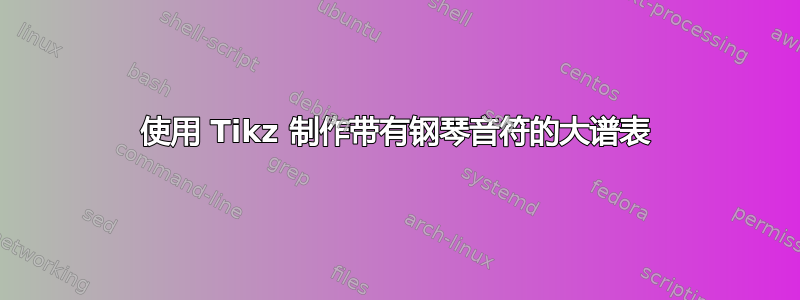
需要实现一个带有钢琴音符的大谱表。我尝试重用钢琴代码,但 tikzpicture 将钢琴图片绘制在乐谱之外。基本代码如下:
\documentclass[tikz,border=3mm]{standalone}
\usepackage[top=3cm, bottom=2.8cm, left=2.5cm, right=0.5cm, marginparwidth=0cm, marginparsep=0cm, headheight=13.6pt, a4paper]{geometry}
\usepackage[T1]{fontenc}
\usepackage{polyglossia}
\setmainlanguage{spanish}
\usepackage{xparse}
\usepackage{tikz}
\usetikzlibrary{arrows.meta, calc}
\tikzstyle{every picture}+=[remember picture]
\ExplSyntaxOn
\NewExpandableDocumentCommand \myFrequencyCalculation { m }
{ \fp_to_decimal:n { round(2**((#1-49)/12)*440,3) } }
\ExplSyntaxOff
\usepackage{musixtex}
\begin{document}
Grand staff with piano notes:
\vspace*{2.5cm}
\begin{music}
\parindent10mm
%\sepbarrules
\instrumentnumber{2}
\setstaffs1{1}
\setstaffs2{1}
\setclef20
\setclef16
\smallmusicsize
\curlybrackets{12}
\nobarnumbers
\font\A=phvb8t at 8pt% second fontsize, 4pt possible, too
\startpiece%
\notes\zcn{``B}{\hspace*{-0.10cm}\bf\A A0}\wh{!`A}&\en
\notes\zcn{``B}{\hspace*{-0.10cm}\bf\A B0}\wh{!`B}&\en
\notes\zcn{``C}{\hspace*{-0.10cm}\bf\A C1}\wh{!`C}&\en
\notes\zcn{``C}{\hspace*{-0.10cm}\bf\A B1}\wh{!B}&\en
\notes\zcn{``H}{\hspace*{-0.10cm}\bf\A C2}\wh{!C}&\en
\notes\zcn{``H}{\hspace*{-0.10cm}\bf\A B2}\wh{!I}&\en
\notes\zcn{A}{\hspace*{-0.10cm}\bf\A C3}\wh{!J}&\en
\notes\zcn{A}{\hspace*{-0.10cm}\bf\A B3}\wh{!b}&\en
\notes&\zcn{`c}{\hspace*{-0.10cm}\bf\A C4}\wh{!c}\en
\notes&\zcn{`c}{\hspace*{-0.10cm}\bf\A B4}\wh{!i}\en
\notes&\zcn{`f}{\hspace*{-0.10cm}\bf\A C5}\wh{!j}\en
\notes&\zcn{`f}{\hspace*{-0.10cm}\bf\A B5}\wh{!p}\en
\notes&\zcn{`f}{\hspace*{-0.10cm}\bf\A C6}\wh{!q}\en
\notes&\zcn{`f}{\hspace*{-0.10cm}\bf\A B6}\wh{!w}\en
\notes&\zcn{`f}{\hspace*{-0.10cm}\bf\A C7}\wh{!x}\en
\notes&\zcn{`f}{\hspace*{-0.10cm}\bf\A B7}\Ioctfinup 1{''s}\wh{!w}\en
\notes&\zcn{`f}{\hspace*{-0.10cm}\bf\A C8}\Toctfin1\wh{!x}\en
\Endpiece
\end{music}
\pgfdeclarelayer{blacknotes}
\pgfsetlayers{main,blacknotes}
\tikzset{tight fit/.style={inner sep=0pt, outer sep=0pt}}
\begin{tikzpicture}[transform shape,scale=0.3]
\def\lastnotenodename{clefs}
\node[text width=1.0cm, tight fit] (clefs) at (0,0) {};
\foreach \note [
evaluate={
\n=int(mod(\note-1, 12));
\midi=int(\note+20);
\octave=int((\note+8)/12);
\t=int(floor((\note-1)/12)*7-7);
\notename={"A","","B","C","","D","","E","F","","G",""}[\n];
\tonicsolfa={"la","","si","do","","re","","mi","fa","","sol",""}[\n];
\blacknote={0,1,0,0,1,0,1,0,0,1,0,1}[\n];
\frequency={\myFrequencyCalculation{\note}};}
] in {1,...,88}{
\ifnum\octave>3
\tikzset{extract anchor/.style={anchor=south west, at=(\lastnotenodename.south east)}}
\else
\tikzset{extract anchor/.style={anchor=north west, at=(\lastnotenodename.north east)}}
\fi
\ifnum\blacknote=0
\edef\notenodename{\notename_\octave}
\node (\notenodename) [tight fit,text width=1cm, extract anchor/.try] {};
\xdef\lastnotenodename{\notenodename}
\node [anchor=base] (sol-fa) at (\notenodename |- 0,-3) {%\tonicsolfa$_\octave$
};
\draw (\notenodename.south west |- 0,-4) rectangle ++(1, -4);
\node [rotate=90, font=\footnotesize, anchor=east]
at (\notenodename.north |- 0,-4) {%\frequency
};
\node [font=\footnotesize, anchor=south]
at (\notenodename.south |- 0,-8) {%\midi
};
\node [font=\footnotesize, anchor=south]
at (\notenodename.south |- 0,-8.5) {%\notename$_\octave$
};
\else
\begin{pgfonlayer}{blacknotes}
\fill ([xshift=-0.25cm]\lastnotenodename.north east |- 0,-4) rectangle ++(0.5, -2.5);
\node [rotate=90, text=white, font=\footnotesize, anchor=east]
at (\lastnotenodename.north east |- 0,-4) {%\frequency
};
\end{pgfonlayer}
\fi
}
\end{tikzpicture}
\end{document}
答案1
standalone您的文档使用选项指定文档类tikz,这会导致每张图片都出现在新页面上。您看到的空间是您使用该geometry包请求的 A4 页面的其余部分。顾名思义standalone,该类适用于独立图片。
您似乎需要一份包含多项内容的文档。因此,请将其替换standalone为常规文档类,例如article。
\documentclass{article}
\usepackage[top=3cm, bottom=2.8cm, left=2.5cm, right=0.5cm, marginparwidth=0cm, marginparsep=0cm, headheight=13.6pt, a4paper]{geometry}
\usepackage{tikz}
\usetikzlibrary{arrows.meta, calc}
\tikzstyle{every picture}+=[remember picture]
\ExplSyntaxOn
\NewExpandableDocumentCommand \myFrequencyCalculation { m }
{ \fp_to_decimal:n { round(2**((#1-49)/12)*440,3) } }
\ExplSyntaxOff
\usepackage{musixtex}
\begin{document}
Grand staff with piano notes:
\begin{flushleft}
\begin{music}
\parindent10mm
%\sepbarrules
\instrumentnumber{2}
\setstaffs1{1}
\setstaffs2{1}
\setclef20
\setclef16
\smallmusicsize
\curlybrackets{12}
\nobarnumbers
\font\A=phvb8t at 8pt% second fontsize, 4pt possible, too
\startpiece%
\notes\zcn{``B}{\hspace*{-0.10cm}\bf\A A0}\wh{!`A}&\en
\notes\zcn{``B}{\hspace*{-0.10cm}\bf\A B0}\wh{!`B}&\en
\notes\zcn{``C}{\hspace*{-0.10cm}\bf\A C1}\wh{!`C}&\en
\notes\zcn{``C}{\hspace*{-0.10cm}\bf\A B1}\wh{!B}&\en
\notes\zcn{``H}{\hspace*{-0.10cm}\bf\A C2}\wh{!C}&\en
\notes\zcn{``H}{\hspace*{-0.10cm}\bf\A B2}\wh{!I}&\en
\notes\zcn{A}{\hspace*{-0.10cm}\bf\A C3}\wh{!J}&\en
\notes\zcn{A}{\hspace*{-0.10cm}\bf\A B3}\wh{!b}&\en
\notes&\zcn{`c}{\hspace*{-0.10cm}\bf\A C4}\wh{!c}\en
\notes&\zcn{`c}{\hspace*{-0.10cm}\bf\A B4}\wh{!i}\en
\notes&\zcn{`f}{\hspace*{-0.10cm}\bf\A C5}\wh{!j}\en
\notes&\zcn{`f}{\hspace*{-0.10cm}\bf\A B5}\wh{!p}\en
\notes&\zcn{`f}{\hspace*{-0.10cm}\bf\A C6}\wh{!q}\en
\notes&\zcn{`f}{\hspace*{-0.10cm}\bf\A B6}\wh{!w}\en
\notes&\zcn{`f}{\hspace*{-0.10cm}\bf\A C7}\wh{!x}\en
\notes&\zcn{`f}{\hspace*{-0.10cm}\bf\A B7}\Ioctfinup 1{''s}\wh{!w}\en
\notes&\zcn{`f}{\hspace*{-0.10cm}\bf\A C8}\Toctfin1\wh{!x}\en
\Endpiece
\end{music}
\pgfdeclarelayer{blacknotes}%
\pgfsetlayers{main,blacknotes}%
\tikzset{tight fit/.style={inner sep=0pt, outer sep=0pt}}%
\begin{tikzpicture}[transform shape,scale=0.3]
\def\lastnotenodename{clefs}
\node[text width=1.0cm, tight fit] (clefs) at (0,0) {};
\foreach \note [
evaluate={
\n=int(mod(\note-1, 12));
\midi=int(\note+20);
\octave=int((\note+8)/12);
\t=int(floor((\note-1)/12)*7-7);
\notename={"A","","B","C","","D","","E","F","","G",""}[\n];
\tonicsolfa={"la","","si","do","","re","","mi","fa","","sol",""}[\n];
\blacknote={0,1,0,0,1,0,1,0,0,1,0,1}[\n];
\frequency={\myFrequencyCalculation{\note}};}
] in {1,...,88}{
\ifnum\octave>3
\tikzset{extract anchor/.style={anchor=south west, at=(\lastnotenodename.south east)}}
\else
\tikzset{extract anchor/.style={anchor=north west, at=(\lastnotenodename.north east)}}
\fi
\ifnum\blacknote=0
\edef\notenodename{\notename_\octave}
\node (\notenodename) [tight fit,text width=1cm, extract anchor/.try] {};
\xdef\lastnotenodename{\notenodename}
\node [anchor=base] (sol-fa) at (\notenodename |- 0,-3) {%\tonicsolfa$_\octave$
};
\draw (\notenodename.south west |- 0,-4) rectangle ++(1, -4);
\node [rotate=90, font=\footnotesize, anchor=east]
at (\notenodename.north |- 0,-4) {%\frequency
};
\node [font=\footnotesize, anchor=south]
at (\notenodename.south |- 0,-8) {%\midi
};
\node [font=\footnotesize, anchor=south]
at (\notenodename.south |- 0,-8.5) {%\notename$_\octave$
};
\else
\begin{pgfonlayer}{blacknotes}
\fill ([xshift=-0.25cm]\lastnotenodename.north east |- 0,-4) rectangle ++(0.5, -2.5);
\node [rotate=90, text=white, font=\footnotesize, anchor=east]
at (\lastnotenodename.north east |- 0,-4) {%\frequency
};
\end{pgfonlayer}
\fi
}
\end{tikzpicture}
\end{flushleft}
\end{document}
答案2
更新后的代码版本如下:
\documentclass[tikz,border=3mm]{article}
%\documentclass[tikz,border=3mm]{standalone}
\usepackage[top=3cm, bottom=2.8cm, left=2.5cm, right=0.5cm, marginparwidth=0cm, marginparsep=0cm, headheight=13.6pt, a4paper]{geometry}
\usepackage[T1]{fontenc}
\usepackage{polyglossia}
\setmainlanguage{spanish}
\usepackage{xparse}
\usepackage{tikz}
\usetikzlibrary{arrows.meta, calc}
\tikzstyle{every picture}+=[remember picture]
\ExplSyntaxOn
\NewExpandableDocumentCommand \myFrequencyCalculation { m }
{ \fp_to_decimal:n { round(2**((#1-49)/12)*440,3) } }
\ExplSyntaxOff
\usepackage{musixtex}
\usepackage{xcolor}
\xdefinecolor{gray-undar}{RGB}{52,52,52}%0-0-100
\xdefinecolor{red-undar}{RGB}{179,35,79}%341-80-70
\begin{document}
Grand staff with piano notes:
\vspace*{2.5cm}
\begin{music}
\parindent10mm
%\sepbarrules
\instrumentnumber{2}
\setstaffs1{1}
\setstaffs2{1}
\setclef20
\setclef16
\smallmusicsize
\curlybrackets{12}
\nobarnumbers
\font\A=phvb8t at 8pt% second fontsize, 4pt possible, too
\startpiece%
\notes\zcn{``B}{\hspace*{-0.10cm}\bf\A A0}\wh{!`A}&\en
\notes\zcn{``B}{\hspace*{-0.10cm}\bf\A B0}\wh{!`B}&\en
\notes\zcn{``C}{\hspace*{-0.10cm}\color{red-undar}\bf\A C1}\wh{!`C}&\en
\notes\zcn{``C}{\hspace*{-0.10cm}\bf\A B1}\wh{!B}&\en
\notes\zcn{``H}{\hspace*{-0.10cm}\color{red-undar}\bf\A C2}\wh{!C}&\en
\notes\zcn{``H}{\hspace*{-0.10cm}\bf\A B2}\wh{!I}&\en
\notes\zcn{A}{\hspace*{-0.10cm}\color{red-undar}\bf\A C3}\wh{!J}&\en
\notes\zcn{A}{\hspace*{-0.10cm}\bf\A B3}\wh{!b}&\en
\notes&\zcn{`c}{\hspace*{-0.10cm}\color{red-undar}\bf\A C4}\wh{!c}\en
\notes&\zcn{`c}{\hspace*{-0.10cm}\bf\A B4}\wh{!i}\en
\notes&\zcn{`f}{\hspace*{-0.10cm}\color{red-undar}\bf\A C5}\wh{!j}\en
\notes&\zcn{`f}{\hspace*{-0.10cm}\bf\A B5}\wh{!p}\en
\notes&\zcn{`f}{\hspace*{-0.10cm}\color{red-undar}\bf\A C6}\wh{!q}\en
\notes&\zcn{`f}{\hspace*{-0.10cm}\bf\A B6}\wh{!w}\en
\notes&\zcn{`f}{\hspace*{-0.10cm}\color{red-undar}\bf\A C7}\wh{!x}\en
\notes&\zcn{`f}{\hspace*{-0.10cm}\bf\A B7}\addspace{-0.5em}\def\octnumberup{\ppffsixteen8$^{va}$}\octfinup{21}{1.3}\addspace{0.5em}\wh{!w}\en
\notes&\zcn{`f}{\hspace*{-0.10cm}\color{red-undar}\bf\A C8}\wh{!x}\en
%\notes&\zcn{`f}{\hspace*{-0.10cm}\bf\A B7}\Ioctfinup 1{''s}\wh{!w}\en
%\notes&\zcn{`f}{\hspace*{-0.10cm}\bf\A C8}\Toctfin1\wh{!x}\en
\Endpiece
\end{music}
\pgfdeclarelayer{blacknotes}
\pgfsetlayers{main,blacknotes}
\tikzset{tight fit/.style={inner sep=0pt, outer sep=0pt}}
\begin{tikzpicture}[transform shape,scale=0.33]
%\node[anchor=south west,inner sep=0] (image) at (0,0) {
\def\lastnotenodename{clefs}
\node[text width=1.0cm, tight fit] (clefs) at (0,0) {};
\foreach \note [
evaluate={
\n=int(mod(\note-1, 12));
\midi=int(\note+20);
\octave=int((\note+8)/12);
\t=int(floor((\note-1)/12)*7-7);
\notename={"A","","B","C","","D","","E","F","","G",""}[\n];
\tonicsolfa={"la","","si","do","","re","","mi","fa","","sol",""}[\n];
\blacknote={0,1,0,0,1,0,1,0,0,1,0,1}[\n];
\frequency={\myFrequencyCalculation{\note}};}
] in {1,...,88}{
\ifnum\octave>3
\tikzset{extract anchor/.style={anchor=south west, at=(\lastnotenodename.south east)}}
\else
\tikzset{extract anchor/.style={anchor=north west, at=(\lastnotenodename.north east)}}
\fi
\ifnum\blacknote=0
\edef\notenodename{\notename_\octave}
\node (\notenodename) [tight fit,text width=1cm, extract anchor/.try] {};
\xdef\lastnotenodename{\notenodename}
\node [anchor=base] (sol-fa) at (\notenodename |- 0,-3) {%\tonicsolfa$_\octave$
};
\draw (\notenodename.south west |- 0,-4) rectangle ++(1, -4);
\node [rotate=90, font=\footnotesize, anchor=east]
at (\notenodename.north |- 0,-4) {%\frequency
};
\node [font=\footnotesize, anchor=south]
at (\notenodename.south |- 0,-8) {%\midi
};
\node [font=\footnotesize, anchor=south]
at (\notenodename.south |- 0,-8.5) {%\notename$_\octave$
};
\else
\begin{pgfonlayer}{blacknotes}
\fill ([xshift=-0.25cm]\lastnotenodename.north east |- 0,-4) rectangle ++(0.5, -2.5);
\node [rotate=90, text=white, font=\footnotesize, anchor=east]
at (\lastnotenodename.north east |- 0,-4) {%\frequency
};
\end{pgfonlayer}
\fi
}
%};
%\begin{scope}[x={(image.south east)},y={(image.north west)}]
\begin{scope}%[x={(clefs.south east)+8.5cm},y={(clefs.north west)}]
%Código para grillas
%\draw[help lines,xstep=.1,ystep=.1] (0,0) grid (1,1);
%\draw[help lines,xstep=.1,ystep=.1] (0,0) grid (53,-12);
%\foreach \x in {0,10,...,530} { \node [anchor=north] at (\x/10,0) {0.\x}; }
%\foreach \y in {0,-10,...,-120} { \node [anchor=east] at (0,\y/10) {0.\y}; }
%Dibujando lineas y texto
\node[] (c1) at (3.0,-10) {\LARGE\color{red-undar}\textbf{C1}};
\draw [-latex, draw = red-undar, line width=1pt] (c1) -- (3.0,-8.1);
\node[] (c2) at (10.0,-10) {\LARGE\color{red-undar}\textbf{C2}};
\draw [-latex, draw = red-undar, line width=1pt] (c2) -- (10.0,-8.1);
\node[] (c3) at (17.0,-10) {\LARGE\color{red-undar}\textbf{C3}};
\draw [-latex, draw = red-undar, line width=1pt] (c3) -- (17.0,-8.1);
\node[] (c4) at (24.0,-10) {\LARGE\color{red-undar}\textbf{C4}};
\draw [-latex, draw = red-undar, line width=1pt] (c4) -- (24.0,-8.1);
\node[] (c5) at (31.0,-10) {\LARGE\color{red-undar}\textbf{C5}};
\draw [-latex, draw = red-undar, line width=1pt] (c5) -- (31.0,-8.1);
\node[] (c6) at (38.0,-10) {\LARGE\color{red-undar}\textbf{C6}};
\draw [-latex, draw = red-undar, line width=1pt] (c6) -- (38.0,-8.1);
\node[] (c7) at (45.0,-10) {\LARGE\color{red-undar}\textbf{C7}};
\draw [-latex, draw = red-undar, line width=1pt] (c7) -- (45.0,-8.1);
\node[] (c8) at (52.0,-10) {\LARGE\color{red-undar}\textbf{C8}};
\draw [-latex, draw = red-undar, line width=1pt] (c8) -- (52.0,-8.1);
\end{scope}
\end{tikzpicture}
\end{document}






